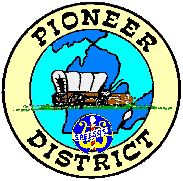


The Pioneer District (known as the Michigan District until 1968) had its official beginning on June 8, 1940. However, our first chapters had already begun organizing in 1939 when the word was widely spread that an organization had sprung up in Tulsa, Oklahoma, featuring good, old fashioned barbershop harmonizing as their mainstay. The infant organization was the brainstorm of one Owen C. Cash, a Tulsa tax attorney, who founded "SPEBSQSA"; with little or no intention of the organization ever attaining the amazing growth as we know it today. He had no idea that there were so many men who, like him, had a nostalgic fed desire to again sample the simple joys of harmony singing, or that they would pursue this hobby with such determined dedication.
On Decoration Day, 1939, a group of veterans was gathered for Detroit's annual Memorial Day Parade and were enjoying a song when attention was called to a newspaper story about a meeting of the newly organized Society for the Preservation and Encouragement of Barbershop Quartet Singing in America, to be held in Tulsa beginning June 2, 1939. All expressed interest; and Ed Schwoppe a member of a quartet known as the STATE HIGHWAY FOUR, said he would go there and investigate.
Schwoppe made the trip to Tulsa with Harold Gibbs, then of Traverse City. Joe Jones a former Detroit #1 chapter president who was quite prominent both in the judging and administrative areas of the Society, described this trip in his keynote speech to the International Board at the international convention in Philadelphia in 1961. "Two men employed by the Michigan State Highway Department (i.e. Schwoppe and Gibbs) told their superiors they ought to go to Tulsa to look over a new type of road building equipment being manufactured there. The deception worked. The state paid the freight, and the two men returned to Detroit with a charter for a chapter [Note: Believe he meant to say they returned as card carrying members, as there were no charters issued at that time.], but with no reports or recommendations on road building equipment. Immediately they gathered about them other barbershop quartet addicts and enthusiasts and organized what was believed to be the first chapter east of the Mississippi.
At the meeting held in the Hotel Tulsa on June 2, a national organization was created with Rupert Hall, of Tulsa, as president. A vice president was named from every state represented, to be "in charge of development." Ed Schwoppe came back as a national vice president and both he and Harold Gibbs were made members of the Tulsa Chapter. Thus Ed became our first national officer, and he and Harold our first card carrying SPEBSQSA members.
THE FIRST MEETING OF THE DETROIT CHAPTER:Prior to the Cash organizational meeting, a group of Detroiters including Howard Tubbs, Monty Marsden, Glenn Shields, Bill Barry, Charlie Hawkins and Mark Roberts were singing in the Faust Post American Legion Glee Club; and, on occasion, throwing in a barbershop seventh to the dismay of the director. This was the group which later formed the nucleus of our first chapter.
On Sunday, July 30, 1939 [Note: An error exists on the present Detroit #1 Chapter charter, which puts the date at July 29, 1939.] a group of twenty men met in the cottage of William Barry at Lake Orion, Michigan. The story of the Society and the convention doings were related to them by Schwoppe and Gibbs. At that meeting the Detroit Chapter was organized and a charter was applied for—the first in Michigan.
[Considerable controversy still rages as to whether the Detroit #1 Chapter was the first chapter organized east of the Mississippi River. Wilmington, Delaware, and Chicago, Illinois, also claim that honor. After studying their "so-called" evidence, it is my considered opinion that there is no way we can prove, one way or another, which chapter was organized first. From all of my studies so far, it appears Detroit was organized first based on so many of the early quotes by Mark Roberts, Joe Wolff, Joe Jones, and others. Add to this the fact that these fellows had been singing together in the Faust American Legion Glee Club for many years prior to the formation of our Society, and had an organized group before the official chartering of the chapter. Unfortunately, I have no tangible proof, and the people who truly knew are no longer with us. The same is true of the other two chapters mentioned. It is suspected that no one really knew, and that the proclamations of being first provided some kind of "bragging rights" for those chapters involved.]
THERE WERE NO CHAPTERS UNTIL 1941Probably a better perspective on this whole matter can be understood by the explanation offered in T. Deac Martin's ten-year history of the Society entitled Keep America Singing, published by the Society. On page 35 of chapter 10, Deac mentions the following, and we quote:
Today lively arguments can be generated around the question—which chapter was chartered ahead of t'other during the Society's infantile years? In 1948, International Secretary Adams said that to give accurate charter dates during the first two or three years 'tis as impossible as for Carroll Parker Adams to jump over the moon. ... There are no national secretary's records prior to 1941. ... As to charters, none were printed until March '41 when the first lot were ordered from St. Louis. ... They were mailed to each city where there had been a show of interest, and a bill for $3 was enclosed. Payment of the bill would make the charter official. Secretary Wodicka sent out about 100. By late June '41 seventeen cities had responded, and the National Treasury had $51 in it to apply upon the 1940-41 operating deficit and to carry on the July '41 contest and convention."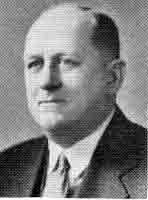
Carroll P. Adams
It is probable that in this context the Detroit #1 Chapter was the first chapter chartered east of the Mississippi; since Carroll P. Adams, being a member of that chapter, would ensure, through his position and proximity to the chartering process at the national office, that Detroit #1 received the first charter actually issued.
At the first July 30, 1939 meeting, those elected as officers of the Detroit #1 Chapter were Joseph Wolff, president; Howard Tubbs, vice president; William Barry, master of ceremonies; and Glenn Shields, secretary and treasurer. Also in attendance at this meeting were Monty Marsden and Jim Creed who became well known to barbershoppers everywhere as fine singers and dedicated members. The VARIETY FOUR, a well-known quartet composed of Tom Carruthers, Leo Stiers, Archie Livingston, and Les Langlois attended the meeting; and, from the record, it seems that this was the first Michigan quartet to be associated with the Society.
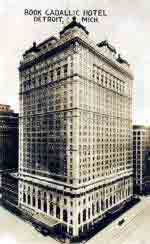 BOOK CADILLAC
|
The first regular meeting of the Detroit Chapter, following the initial meeting, was held at the Book Cadillac Hotel in Detroit on August 25, 1939, with about 50 men in attendance; and barbershopping in Michigan was off to a great ringing start. Several out-state visitors were in attendance at this historic meeting, and they returned home determined to organize chapters—and organize them they did.
Considerable publicity was given the group by the press throughout the state and a membership drive was instituted. One of the first recruits was Carroll P. Adams, who was to become an important figure in the organization. Schwoppe, in the meantime, promoted the Society in various other sections of the state and organized the Lansing Chapter in September of 1939. The Flint Chapter was organized the following month with the help of Guy Stoppert. Grand Rapids was next on November 1, 1939, when Roscoe Bennett and Vern Hale rounded up a group of harmony enthusiasts. Four chapters were firmly in the fold at the end of 1939.
In the spring of 1940, we had only four chapters and no district organization; but that gang at Grand Rapids thought this was enough to have a quartet contest, and they were right. At their invitation and with the assistance of the Schubert Club of Grand Rapids, a state contest was held in the Pantlind Hotel Ballroom on March 9, 1940. Quartets appeared from the organized chapters, Detroit, Lansing, Flint and Grand Rapids, and from Birmingham, Jackson, Muskegon and Saginaw. Eighteen quartets showed up and the winner was the SAWDUST FOUR of Muskegon (Len Horton, Raymond Johnson, Bill Griffith and George Hansen). In second place was the DETROIT ELKS FOUR (Bill Barry, Fox, Ackerman, and Logan) and third place was taken by the STATE HIGHWAY FOUR (Gibbs, Schwoppe, Stanley, and Hathaway) from Lansing. The fourth place winner was the VARIETY FOUR of Birmingham (Carruthers, Stiers, Livingston and Langlois). This was quite a "ball" and greatly enjoyed by all, including the losers. Roscoe Bennett and the Grand Rapids Chapter led the way, and this was the first state-sponsored contest [the district wasn't organized yet] ever held in our Society, and the SAWDUST FOUR quartet was our first state champion. It was truly a memorable occasion, although we're sure that the participants did not realize it at that time. Time has a way of attaching importance to events of this nature.
THE DISTRICT WAS ORGANIZED:
In the spring of 1940, we had only four chapters in the fold, the Detroit Chapter, through Joe Wolff its president, invited the other three chapters to join it in organizing a state association of chapters. A meeting was arranged in Detroit for June 8, 1940, and the Michigan District was born, a constitution was adopted and officers elected.

Carroll P. Adams
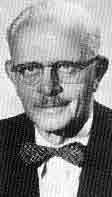
Roscoe D. Bennett
These officers were Carroll P. Adams, president; Ed Schwoppe, vice president; Guy Stoppert, secretary; and Roscoe Bennett, treasurer. This was the first appearance of Carroll Adams in an official capacity; and no one yet has matched him for vision, organizing ability, hard work and desire to see the barbershopping idea exploited to its utmost potential. Under the relentless drive of Adams and the other district officers, a pattern emerged which was to make Michigan the barbershop capital of the world. [And still is!]
In the evening of the day (June 8, 1940) the district was organized, the Detroit Chapter staged the Society's first Parade of Quartets. This was held in the ballroom of the Book Cadillac Hotel to start a series of shows that has been staged annually by the chapter ever since. Almost all the quartets on this first show were from the Detroit Chapter which, although having about sixty members at the time, put eight quartets on stage and this was increased two years later to eleven quartets.
"These early affairs were stag and beverages were served during the first show. As Mark Roberts puts it, "This made for a good, full evening with the chords and the beer all flowing along together beautifully in a sort of poor man's `Ten Nights in a Bar Room'; it seeming that the more you had of one, the better the other sounded or tasted. So there we were inventing the afterglow and, in our innocence, not even knowing it. Upon sober reflection, which, of course, was the next day, we decided that there was a time to sing and a time to drink; but that the twain should not meet at show time when the general public was invited. Whatever we may have concluded, it took a couple of years to get the beer out of our shows and even our first state contests were a bit on the soggy side. In any event, this first Parade of Quartets was great fun for us and our guests, and it established the fact that people wanted to hear our music and would even pay money for the privilege, with or without beverages"
The second national convention was held in New York on July 26, 1940, in conjunction with the World's Fair. At the meeting only three national vice presidents were chosen, no longer one from each state. These were Al Smith of New York, George Hillyer of Topeka, and Carroll Adams of Detroit.Joe Wolff (pictured here) of Detroit was elected to the National Board of Directors.
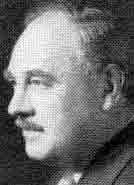
Joseph Wolff
The State Association held a fall meeting in Lansing on September 28, 1940, at which time Muskegon and Saginaw became members. Representatives from Jackson and Kalamazoo were present to obtain information.
[index]
[1940]
[1941]
[1942]
[1943]
[1944]
[1945]
[Contents]
Page Updated